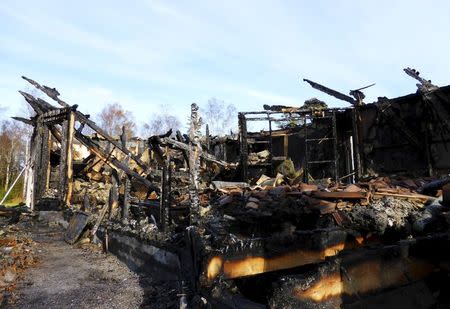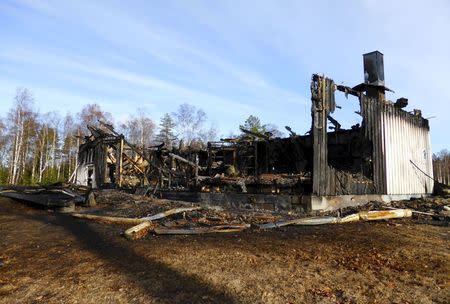After escaping war, asylum seekers in Sweden now face arson attacks
By Johan Ahlander and Violette Goarant MUNKEDAL, Sweden (Reuters) - Throughout Europe's migrant crisis, Sweden has laid out the welcome mat for tens of thousands of asylum seekers. But in towns like Munkedal and other small communities, someone has replaced it with death threats and arson. For all Sweden's self-proclaimed role as a "humanitarian superpower", many of the new arrivals dotted around the country are living in fear after a wave of unsolved attacks on asylum centers. One such is Mustafa, a computer student from Gaza who arrived just over a week ago at the reception center in Munkedal, which lies amid the forests and farmland of southwestern Sweden. "For one day I felt safe," said Mustafa. "The day after my arrival, the house burned down." When the center housing 14 asylum seekers in a forest clearing went up in flames, the occupants had to escape through a window and shelter in a nearby building. Now they patrol the area in nearly sub-zero temperatures each night, using only the dim lights of mobile phones to peer into the forest for any intruder bent on destroying their temporary home. The Munkedal blaze was just one of more than a dozen at centers across Sweden in the past month - some confirmed as arson attacks and others suspected as such - that the police are struggling to solve as the country expects to take in up to a record 190,000 asylum seekers this year. While no one has died in the fires, a sword-wielding masked man killed two people and wounded two others last month in a racist killing spree at a largely immigrant school in Trollhattan, a short drive from Munkedal. With fewer than 10 million people, Sweden has received proportionately more asylum seekers than any other European Union country, as huge numbers of people escaping war and poverty head north across the continent. Opinion polls show most Swedes support this, and volunteers welcome refugees with mobile clinics when they arrive off trains at the end of their long journeys. CLIMATE OF VIOLENCE However, the open door policy is under strain, playing into the hands of the anti-immigration Sweden Democrats, the country's third biggest party which holds the balance of power in parliament. There is no evidence of any link between the Sweden Democrats and the attacks, which the party's leader Jimmie Akesson has condemned. Nevertheless, Foreign Minister Margot Wallstrom has accused them of helping to create a climate of violence with rhetoric over the dangers of immigration and their decision to publish the addresses of planned asylum centers. Sweden's Migration Agency is now keeping secret the locations of new centers, where asylum seekers live while their applications are processed, fearing new attacks. However, it faces a shortage of private guards to protect the properties. "It's a big problem," said Mikael Ribbenvik, acting Director General at the Migration Agency. "Our contracted suppliers cannot always meet the demand." With no one arrested, the security services have stepped in to help over-stretched police protect the asylum centers. Helicopters equipped with infrared cameras will fly at night, guiding police patrols to any suspects. Although arson attacks on refugee centers are not uncommon in other European countries such as Germany, they have still led to much soul-searching in Sweden, a country that likes to see itself as a beacon of tolerance in Europe. "This is not the Sweden we know, it is not the Sweden I am proud of," center-left Prime Minister Stefan Lofven said. Lofven is the latest in a line of leaders who over the decades have welcomed refugees ranging from Vietnam war draft dodgers in the 1960s to those fleeing the Gulf War in the 1990s. Mona Sahlin, the government's coordinator on tackling violent extremism, believes ultra right-wing groups have been behind the arson attacks. But the policy of spreading asylum seekers around the country while their cases are considered may also be provoking a backlash among those Swedes who don't like large numbers of migrants in their backyards. LAST WARNING In northern Sweden, a note in Arabic - written apparently with the help of an automated translation website - was posted on the door of a hotel turned into a center for 250 asylum seekers. "This is the last warning. Leave our town. You cannot survive the winter," stated the note published in local media. "If you do not leave this place you will die. Remember, there are no police here. We can do what we want to you," added the message, which read from left to right - the wrong way in Arabic. With some Swedes fearing the arrival of asylum seekers might raise local crime rates or overload school and health services, the Sweden Democrats have distributed flyers with the locations of planned asylum centers. Many are set up in rural Sweden where support for the far right is strongest. In the southern town of Lund, where a planned home for unaccompanied minors was torched this week, they published maps of centers on the party's Facebook page. "All of you who are here today and applaud, you should be proud of yourself, because you are the spearhead that we need to take our country back," Kent Ekeroth, a Sweden Democrat lawmaker, told a rally in southern Sweden. U.N. Human Rights Commissioner Zeid Ra'ad al-Hussein warned last month that politicians in Europe who use derogatory language about migrants may ultimately be responsible for causing violence. Ihab Nasser, who came to Sweden earlier this year from Eritrea, is one of those in Munkedal who spends the night peering into the forest away frond the town's street lights. "We're terrified. We take turns to sleep and there's always someone keeping guard," he said. (Additional reporting by Daniel Dickson in Stockholm; Editing by Alistair Scrutton and David Stamp)



